The Amish are a decentralized network of traditional Anabaptist Christians. They travel by horse. There’s no internet. They don’t go to public schools and are known for their entrepreneurial prowess.
That’s what I knew going into this. For three days, I stayed with an Old Order Amish family in Lancaster County, Pennsylvania. I connected well with my host, by talking about healthy eating and herbicides in the food supply. He drove me in his horse and buggy to a cow-milking operation. I drove him in my Tesla to his friend’s home food store. We discussed the mental health situation in the Amish and English (non-Amish) populations. We talked about COVID and the Amish community’s response. He taught me about the Amish ways.
The Amish people I met were competent, efficient, and calm. Jovial, but not potently funny. They live a life of serenity, abundance, and contentment — as opposed to growth, volatility, and chasing. The irony is that their population is growing and ours is not. The Amish population is doubling in size every twenty years and now I know why.
Often I don’t know why I’m doing something until after I do it. You can’t connect the dots looking forward, you can only connect them looking backward.
I decided I shall live with Amish people, I said on a podcast that I will do it, and now I’m doing it. On long highway drives, I question what I’m doing.
“Just show up,” I tell myself.
I show up in Lancaster, Pennsylvania, which I thought would be an Amish village. It’s a small modern city — a little-known gem on the gritty east coast. It’s before the arrival time for my AmishB&B so I visit a coffee shop in the city. There are liberals selling CBD coffee and stickers that say “Pregnancy begins with a penis.”
I pick up a sticker. “This seems random,” I say to the cashier. She explains why she made them, something to do with the Supreme Court. I don’t respond.
I drive out of the city into pure farm country. I pull the Tesla up to a 1790 stone house. I punch in the code and poke around my apartment. There’s no television. The decor is Christian. Overall, I’m pleasantly surprised.
I go back outside to my car. An Amish man is in the backyard. A large German shepherd comes running at me. “She’s friendly,” he says. That’s what they all say. But this dog really is friendly — no barking, all cuddles. The early thirties Amish man is Steven, and this is his house.
“Where are you from?” Steven asks.
“New Hampshire. I love it up there. Big mountains”
“I’m sure you do.”
“Is that raw milk I saw in the fridge?”
“Oh no, we don’t give raw milk to visitors. We drink it ourselves though.”
“I’ve never had a problem with it.”
“You drink raw milk?”
“Yeah, my favorite is raw milk yogurt.”
“Oh we make our own, we’ll get you some of that.”
“I saw a horse and buggy on the road this morning,” I say. “That’s the first time I’ve seen that. It was like seeing Santa Claus.”
“But Santa Claus isn’t real, we’re real,” says Steven. He has a wife, three young children, six hundred chickens, and two dogs — the shepherd mix and a Goldendoodle puppy.
For the majority of their lives, Amish people do not engage with the internet. Their nervous systems are different. Steven smiles a lot and never interrupts. It’s easy to have a conversation. There’s a lot of eye contact.
"We have church in our homes," he tells me.
"How big are the church groups?"
"Once we get to 42 families we split into 21 and 21."
"42 is the magic number?"
"Well, depends on the number of kids. 40-45. 42 is the average."
"Do families have a lot of kids these days?"
"No not really. Five or six.”
I laugh. "That’s not a lot? In my world, one or two is a lot."
He laughs. "It used to be 7 or 8. Before that, it was 9 - 12. I come from 11. I’m the youngest of 11."
I look around at the farm.
"Is all this land yours?"
"Yeah."
"Big operation."
"Not really, we only have 600 chickens."
"How long have you lived here?"
"Seven years. We rented for two then bought it. It’s like eating an elephant."
I try to process this.
"It will take a long to pay off," he adds.
“Right, right.” I nod my head.
Steven has a job, an Amish B&B, an apartment rental, the chicken operation, and a neck massage side hustle. He went to school until eighth grade.
It makes sense.
Inside, there’s a Holy Bible on the bed stand. A sign says, “God sees us how we can be but loves us as we are.” I look out the window. An Amazon truck blows past a young lady in a bonnet driving a horse-drawn carriage. This is real. The Amish women I’ve seen around town have a particularly feminine physique. They are reserved, around me at least. I see them lightly smiling as they work. They look like wife material.
RoundUp Mental Health
I go on a run and ride my bike. Then I’m not sure what to do so I play in the yard with the Goldendoodle and shepherd.
Steven is outside as well and we get to chatting.
"I work for Pennsylvania Ag, right over there." He points to a building across the fields.
"I read and write about the herbicide RoundUp. Do you know anything about RoundUp?" I ask.
"I’m totally against RoundUp. We don’t sell RoundUp," He's animated. "We sell an oil that farmers can add to the RoundUp to keep it on the top one inch of the soil so the sunlight and microbes can break it down. There’s a lot of activity in the top one inch of soil."
"Do you guys sell GMO seeds?"
"We sell GMO corn because if the farmer wants it they’re gonna get it one way or another. We don’t sell RoundUp though. We advise people on best practices for RoundUp and sell a product to make it less dangerous."
"That’s cool. It was 1974 that glyphosate Roundup hit the market so we’re coming up on fifty years of glyphosate use. Then in the 90’s the GMOs came out and they could go crazy with it."
"1974?"
"Yup. What do you think the effects are? I think it’s causing more allergies."
"Well, the glyphosate locks up the minerals. If there’s no minerals, you have nothing."
"Do you mean no nutrition?"
"Yeah, you need the minerals for nutrition and your’re body won’t feel satisfied if there’s no nutrition so you just keep eating and growing larger. Our family eats a lot of salt with minerals.”
“I have salt I love. I think it’s from Utah.”
“It’s not Redmond’s, is it?”
“It is!”
“We get ours from Baja. We’ll get you some of that.”
We bond over mutual disgust of RoundUp.
He asks me what I do for work and I tell him I write books.
“What are your books about?" he asks.
"My first book is stories inspired by true events. My second is about Elon Musk and his philosophy. And the third is about health and mental health which is a challenge for people in my world, especially young people.”
“One of my passions is mental health. We have facilities here, they’re packed."
"With English?"
"No, with Amish. They’re packed."
"What do they have? Like anxiety and depression?"
“Yeah that’s most of it. We see it in kids too which is strange. I want to know why.”
“That’s the big question. I think there’s many reasons.”
“It’s gotta be environmental. People say depression is a spiritual thing but from what I’ve seen it’s not. It’s in the kids. How could it be spiritual if it’s in the kids?”
“Around half of teenagers say they have depression or anxiety,” I tell him.
“What? Get out of here.”
“Around 20% of Americans are on psychiatric medication.”
“Noo, really?”
“30% of young women say they have a mental health condition.”
“What’s going to happen to this country in 40 years? I didn’t know the numbers were like that.”
"For the Amish community, what do you think the numbers are, 10%? 20%?"
"Oh no, less than ten percent. An Amish guy was telling me he was on depression meds for 17 years and he listed them. He said the doctors say it balances the brain chemistry but he said it did exactly the opposite."
I blurt out laughter.
Horse and Buggy
Steven is working in the garage part of the large barn. His youngest son is there too, climbing on scaffolding, picking up scraps of jagged metal, and adding them to the loader for disposal. The little boy works quietly.
"Do you need a hand? " I ask Steven.
“Sure!”
The three of us compile scraps of wood, metal and plastic from the work site.
Steven decides he wants to show me his friend's cow milking operation. It’s the time that they’ll be milking. He brings out one of his horses and brushes her off. He pulls out the buggy and rigs them up.
We take the buggy clickety-clack down the narrow road to John’s dairy farm. John’s beard is edgy by Amish standards. We watch him and his wife rig the cow's udders with milk suckers. The operation runs on compressed air. The Amish are more technical than I thought they’d be.
John’s wife gets me a half gallon of raw milk for $2.
"This is all non-GMO,” Steven tells me. “Well, maybe the beans…no he grows his own beans.” Steven takes into consideration the food that feeds the cows that produce their milk.
"This might seem like a strange question, but how often do you eat alone?"
He’s confused.
"Like without my family?"
"Yeah, family or friends."
"Sometimes at work I eat lunch by myself but almost never. Almost never."
"Do any English people ever convert to being Amish?" English is the word for non-Amish mainstream people.
“One guy, David. He was a German. He converted and married an Amish woman. So one every 50-100 years.” He laughs.
“Sounds like my odds aren’t good then.”
If it wasn’t for the mandatory bowl cut I’d be down to convert.
Decentralization
Steven’s voice is a blend of optimism and localism. Natural authenticity. He knows nothing less. There’s no porno vice in his pocket nagging him. There’s no video game tugging on his brain. There are no television shows warping his worldview. He never interrupts, holds eye contact and contributes every conversation.
Why limit transport to horses and push bikes and limit electricity to tool batteries or solar? Localism and decentralization.
The Amish are a decentralized community and each church group makes their own rules; however, there are common denominators among the Old Order Amish churches. No cars, no grid-tied electricity, and no mustaches.
The horse is only willing to pull you 18 miles. A pedal bike could take you triple that, far away from the community. So their bikes are push bikes. They use electricity but they don’t connect their homes to the electrical grid. I had electricity in my apartment, but on their side of the house, their lights run on tool batteries or oil candles. Some Amish homes have an off-grid solar setup. They do not depend on the grid. They’re committed to a decentralized energy setup.
On the surface, some of the rules seem petty, but the downstream effects hold their groups together. The men wear suspenders, the women wear dresses. The men look like dorks, but I understand it creates an in-group out-group scenario and signals allegiance to the tribe. It’s a simple life and simplicity is a winning strategy.
COVID Convo
“Was it an easy decision to join the Amish church?”
“Not really. It’s gotten easier since COVID. I mean, I heard stories about what English people experienced. I was like, how could you live like that? Grandparents couldn’t see their grandchildren because they didn’t get the shot.”
“How did the Amish community respond to COVID? Were they reactive, like wearing masks and stuff?”
“That’s one good thing about the Amish, we were all on the same page about that. No masks.”
“Were you able to have gatherings?”
“We skipped church for four weeks.”
“Four weeks?”
“Yup.”
“We're all on the same page. You can't find unity like that in the world, hardly anywhere else, where everyone's on the same page like that. I know that was tearing families apart, the different opinions. If you didn't do this, then they're not going to hang out with you.”
“Yeah. For me, it was a big thing. Intra family it was causing divisions.”
“Right. We didn't have that. Not at all in the families and basically none in the community. We’re all on the same page. So that in itself is worth a lot, to me. Yeah, there are times when it would be convenient, but we don't need convenience. That’s my opinion, not on Earth, we don't need convenience.”
“So you got married around ten years ago?”
“I was 23.”
“And that’s when you’re full committed?”
“Right. Well, I joined the Amish church at 19, a couple years before I got married.”
“So 19 you made the commitment.”
“Right. Pretty much.”
“You said you had some hesitancy?”
“Not really because the youth group I joined when I turned 16 was a Christian youth group. We didn’t have vehicles. There was some alcohol, but nothing like parties every Saturday night like some of the youth do. There are sixty or seventy youth groups in Lancaster County. You can pick and choose what you want and that varies greatly. The youth group I joined, I wanted. I wasn’t as exposed to all kinds of negative stuff, so it wasn’t as difficult to join the church. Once in a while, we had some alcohol. I’ve had alcohol maybe three times in my life. Tastes horrible. Why bother? So it wasn’t like I was addicted to that or anything.”
“Are you grateful you don’t necessarily have to engage or worry about new technology?”
“There is some. With the community support it’s easier to not have those things. If your peers, if everyone around you has it, there’s much more peer pressure, where you want to have it.”
“Exactly. It’s hard for us to get off our phones because if you get off your phone and look up, everybody around you is still looking at their phones. But when we go out into the wilderness, all of a sudden no one has their phones and it’s good. It’s like a normal human experience. It’s much more tolerable to abstain from the Internet when you have 100 friends also doing that.”
“Right, exactly. You can communicate face to face.”
“So you guys have phones?”
“I do have a cell phone. I have a flip phone. And I don’t carry it with me. It’s basically a house phone. If someone needs me they can leave a voicemail. I’ll get back to them when I get back to them. That’s the way it is. That frees you up a lot. If you have a phone you’re looking at it every five minutes. You’re waiting on the notification bell…I was on Facebook for a couple months. That did NOT work.”
“Why didn’t that work?”
“You have so much more distraction. That was in 2012. Oh man, all the political opinions on that. I was like, I don’t need this stuff.”
“Do you have a computer to go on Facebook?”
“That was a smartphone. That was before I had my flip phone.”
“There’s a lot more flexibility than I thought, I suppose.”
“That was before I was married. Typically, even when you join the church but aren’t married there’s more flexibility there. Then once you get married it’s expected you get rid of some of those things.”
“Do you worry about worldly news?”
“Not really. Some. If something needs to be found out we’ll find it out. We need to be aware of what is going on to a certain extent.”
“All this stuff about wars in other countries, it’s too much for me to keep track of. I just try to focus on my country.”
“Right. Focus on the things you can have control over. Folks have too many things they’re worrying about that they have no control over. Wars or whatever. You can’t do anything about that. But if people can focus on what they can control instead of what they can’t control then it would be a better country.”
“Yeah.”
“You can control yourself.”
“Thanks for answering some of my questions.”
“No problem.”
“It's too bad someone else is coming tomorrow you could've hung out all day.”
“I’d like to go to your friend’s food store that you told me about.”
“Here's the address.” He writes it down and hands it to me. “Go down the driveway and into the garage on the left. It’s self-service. Maybe I should go with you. I’ll get some cream. But this time, we’ll take your ride.” He looks at the Tesla.”
“Alright, let’s do it.”
We rendezvous in the driveway after dinner. I have the passenger seat pre-heated to the max. I show him how to open the Tesla doors.
I show him the acceleration. He laughs like a child.
“That’s nuts,” he says.
“I kill a lot of bugs with this car. It gets crazier,” I tell him.
“No kidding?”
I turn on autopilot.
“It has cameras on it that allow you to have it do the driving. So now it’s doing the driving. It will see the stop sign up here.”
“Nahhh…. What?”
“I’m not doing anything.”
“What about highways? It wouldn’t shift lanes or does it shift lanes for you?”
“Yeah, it’ll shift lanes,” I say with some guilt in my voice.
“It will?”
“Yeah.”
“Sheesh.”
“That’s pretty much it. The screen does lots of cool little things, games and stuff.”
“Play games while you’re on cruise self-drive mode.”
“The thing everybody loves is they have a karaoke thing you can do while you drive.”
He lets out a deep chuckle.
“They call it Caraoke.”
“Caraoke — okay.”
“Is your butt getting warm yet?”
“I figured that out pretty quick.”
“The seats lay flat and I have a sleeping bag back there.”
“So you can sleep while it drives on the highway.”
“Probably in a couple of years.”
“I gotta get a horse and buggy that does that.”
We pull up to his friend's house and enter the garage to shop for food. Fresh cream is $2 a quart. There are chicken hearts and cow livers for sale.
***
Three days in Amish country is a glimpse of a lifestyle that I will never have the option to live. I can’t go back to religious traditionalism after growing up in techo-atheism. Once you’re English, there’s no going back. It’s too boring. The current flows from reading the Bible to watching a screen. From church in the barn to Zoom calls. From handwritten letters to DMs. From horse and buggy to EV on autopilot. From books to Toks. From cream to soda. From conversation to scrolling. From silence to noise. From sex to porn. Potent stimuli breeds expectation for more potent stimuli.
The Amish are producing 4-5 babies per woman starting at age 20. Their population has been doubling every twenty years.
In contrast, every tech-laden population in the world, except Israel, is below the population replacement rate. The effects of birth rate collapse aren’t obvious until it’s too late. In countries like the USA, population shrinking is being offset by immigration. But importing people from surrogate countries won’t work forever because those exogenous baby factories are producing fewer and fewer people as they too are on the path of techno-atheism, albeit, a generation behind.
As millions of childless and low-child techno-atheists die off, the population of the Amish will still be going to the moon. If they continue as they are, the Amish will double eight times in the next 200 years, rising from 360,000 today, to 92 million. This is how traditional religious life makes a comeback. They don’t have to do anything other than continue procreative sex and eating food that keeps them fertile. Ten doublings and there will be 368 million Amish people. If things continue as they are, there will be far more Amish than English in America. But things don’t usually continue as they are. In a couple hundred years, there might be Amish people selling “Pregnancy begins with a penis” stickers, but I doubt it. I’m putting my money on the Amish.
The horse and buggies and lack of screens reminds me of Havana, Cuba. It’s so close to mainstream America but so, so far. It feels almost fictional. It’s mind-boggling that Amish people even exist. There is no one else like them. The men all have bowl cuts and suspenders. They don’t use the internet. They communicate with each other in their language called Pennsylvania Dutch. Horses pull them around in wagons. I can’t get over that. They have church in the barn. The children go to a one-room schoolhouse. They finish school at fourteen. They get married in their early twenties.
I am glad this exists.
The conversations and connectedness with the people, dogs, horses, and chickens, magnetize me back to Amish country. I want to bring my friends here and I still have a lot to learn. Also, they have the best cream and berries and the best prices.
Years ago, I took an online calligraphy class to get my final college credit and receive a business degree, thus appeasing my parents' panic. I forgot the business stuff but I still practice calligraphy. I brought my ink and pen to Pennsylvania to make calligraphic gifts for my Amish host family.
On the final morning of my stay, I presented the calligraphy gifts. Steven loveds it. He and his wife gave me 36 eggs, homemade yogurt, apple chips, granola, and a small bucket of Baja Gold salt.
To get back to New Hampshire, I sat in traffic for nine hours. I had to go near New York City. It’s a fair price to pay to gain an Amish friend.
Bonus Photos and Video
Thanks for reading
I’m focused on creating truthful, authentic, and useful media. The result is maximum insight through entertainment.
I’m shooting my shot at writing books. To support my journey, subscribe here on Substack. Hell, if you're feeling crazy, become a paid subscriber. My paid subscribers receive free copies of my books. It’s $5.
I’ve done dozens of curiosity conversations with people all around the world which has been amazing. Schedule a call here.
Have a pleasant rest of your day.




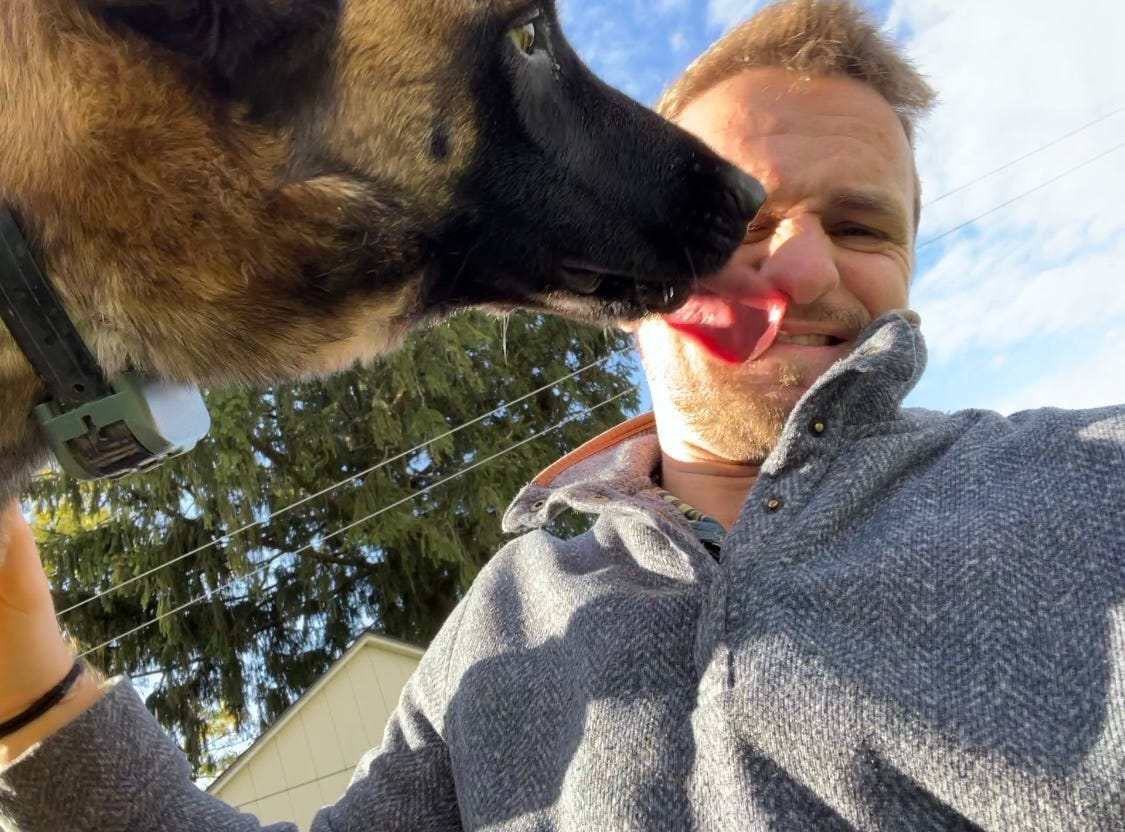
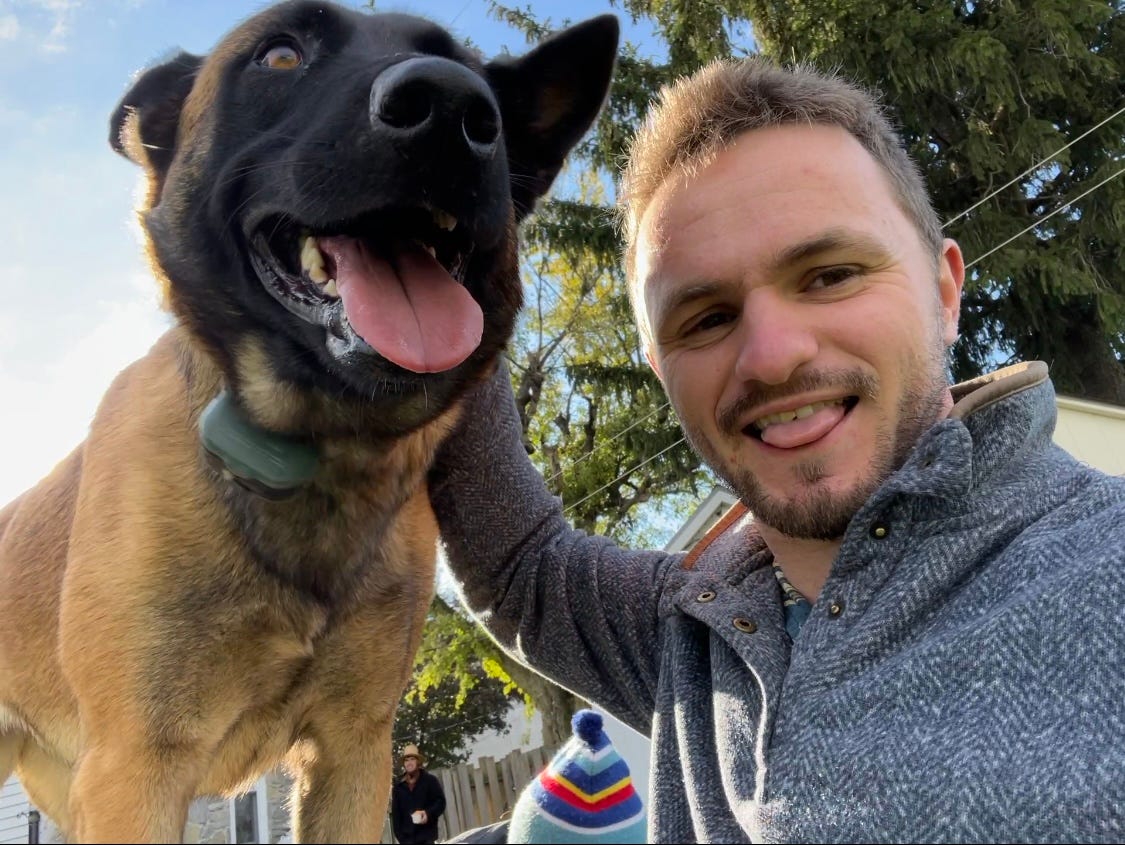

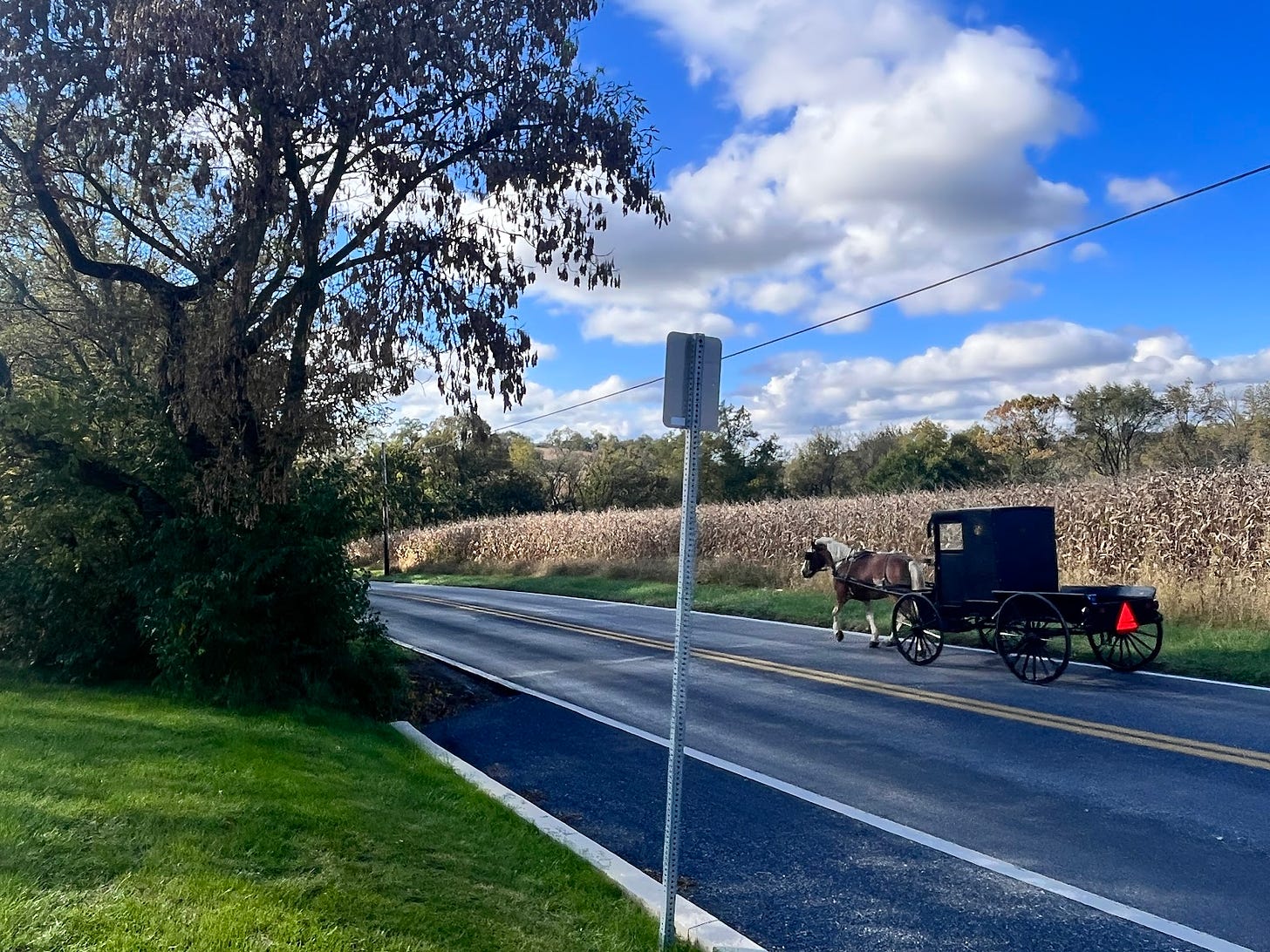


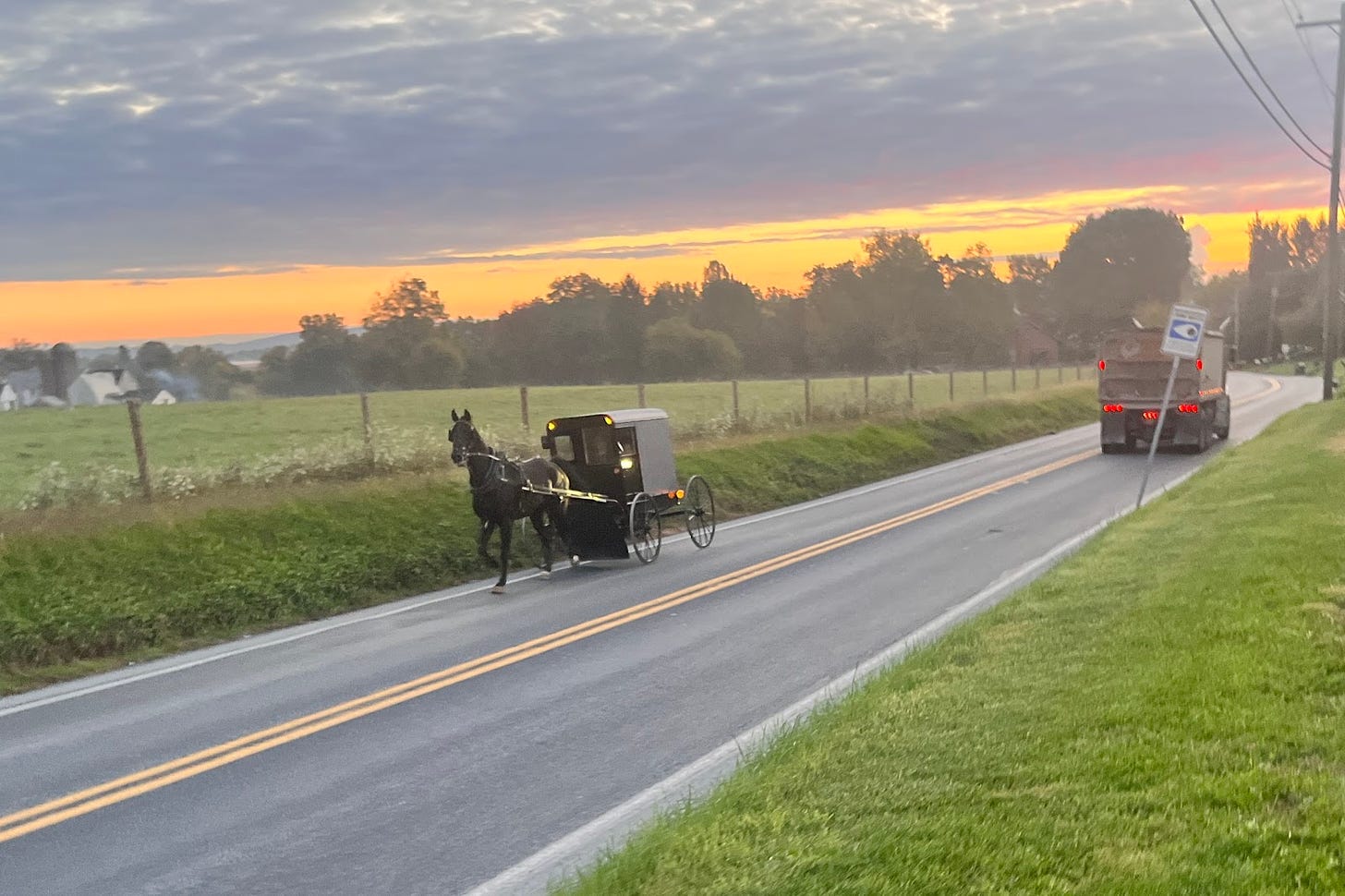



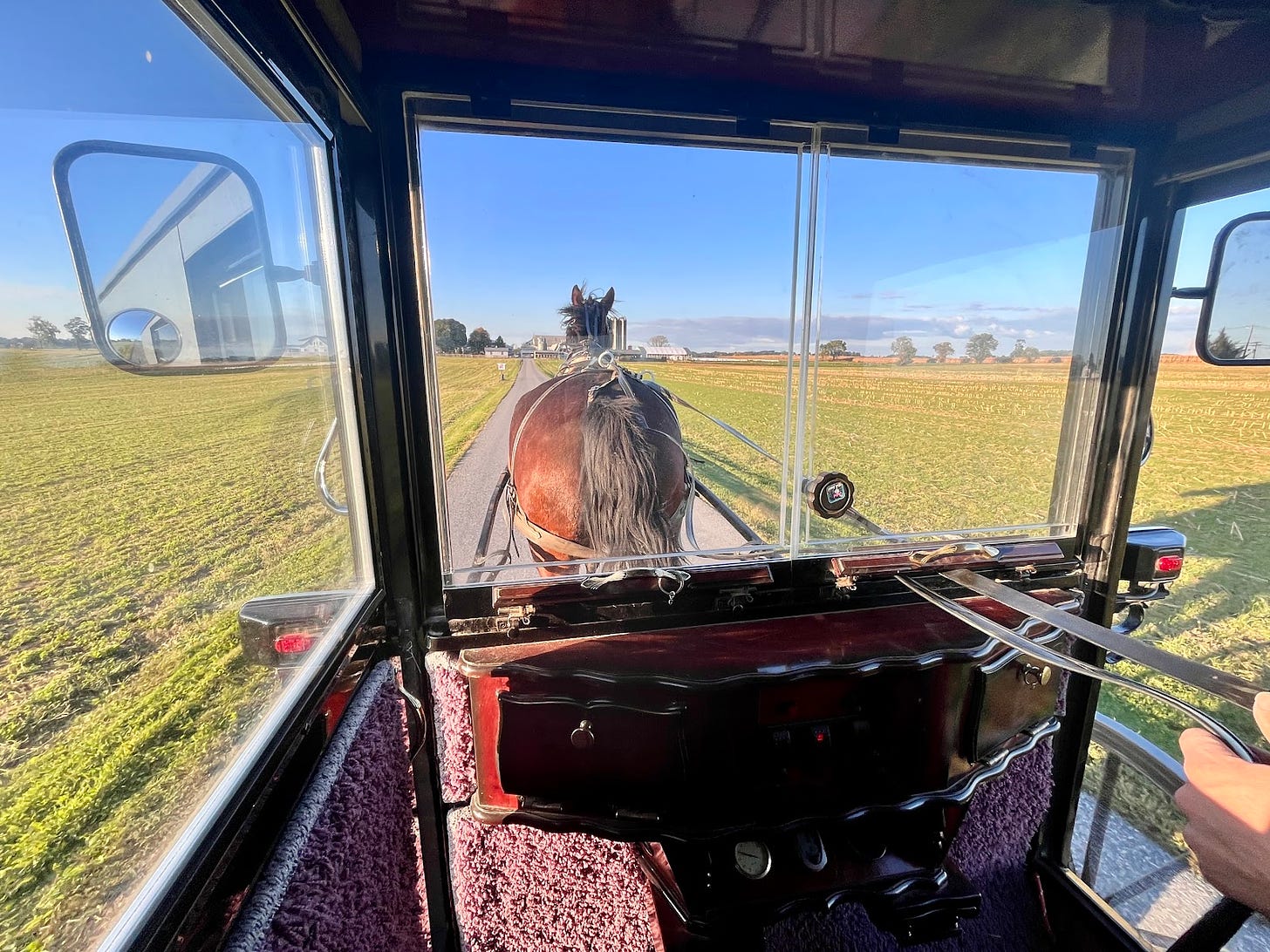
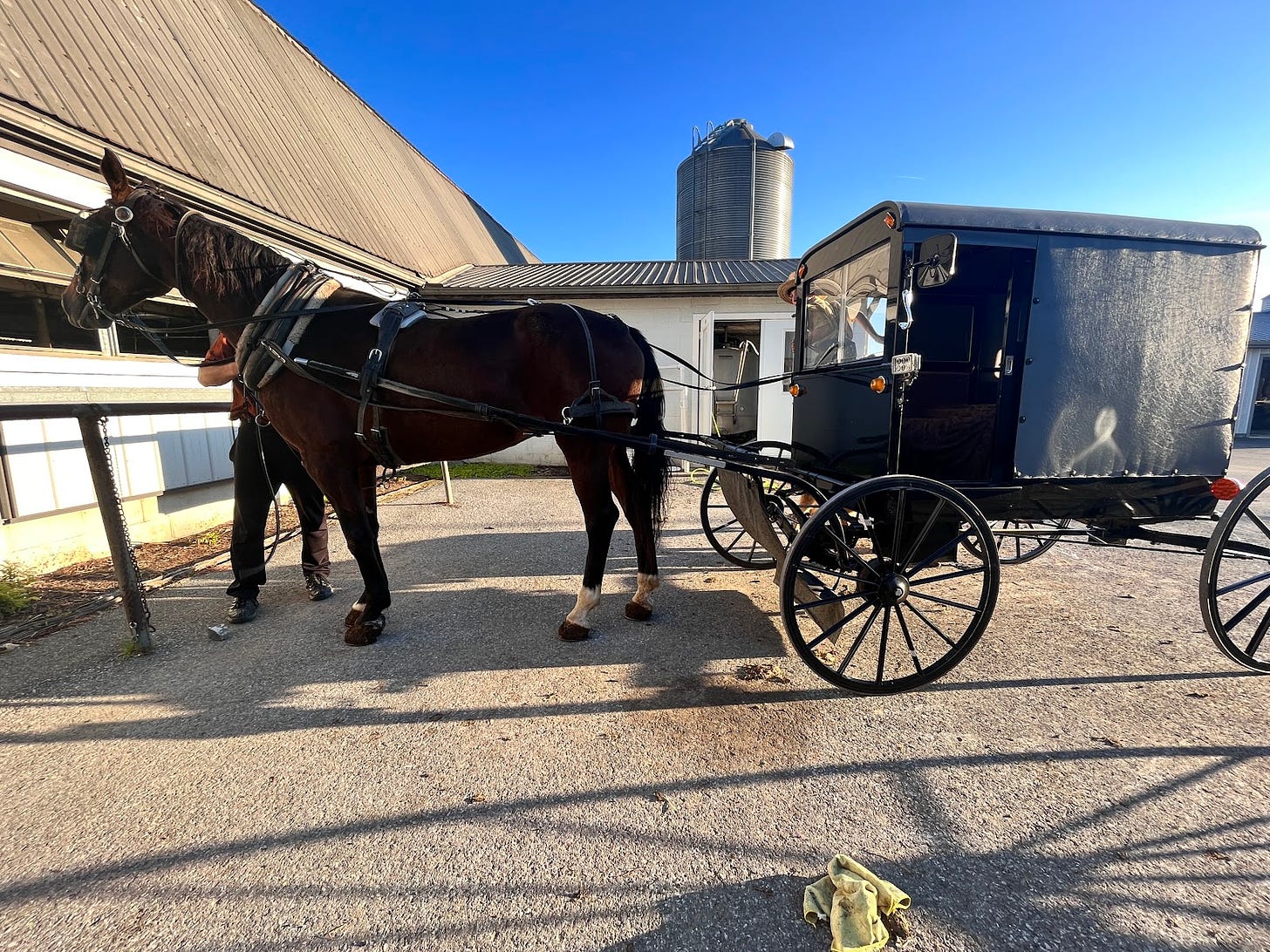
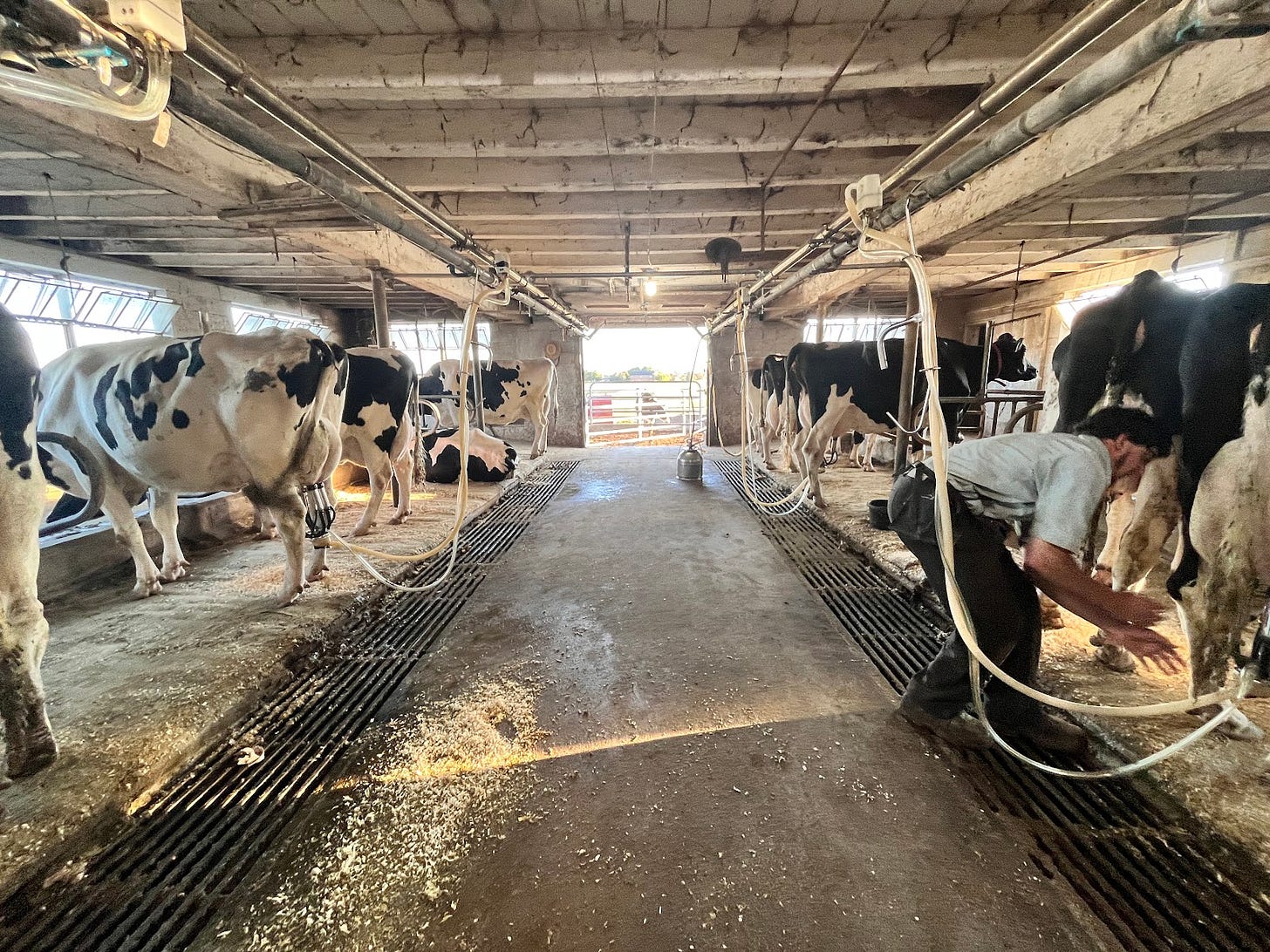

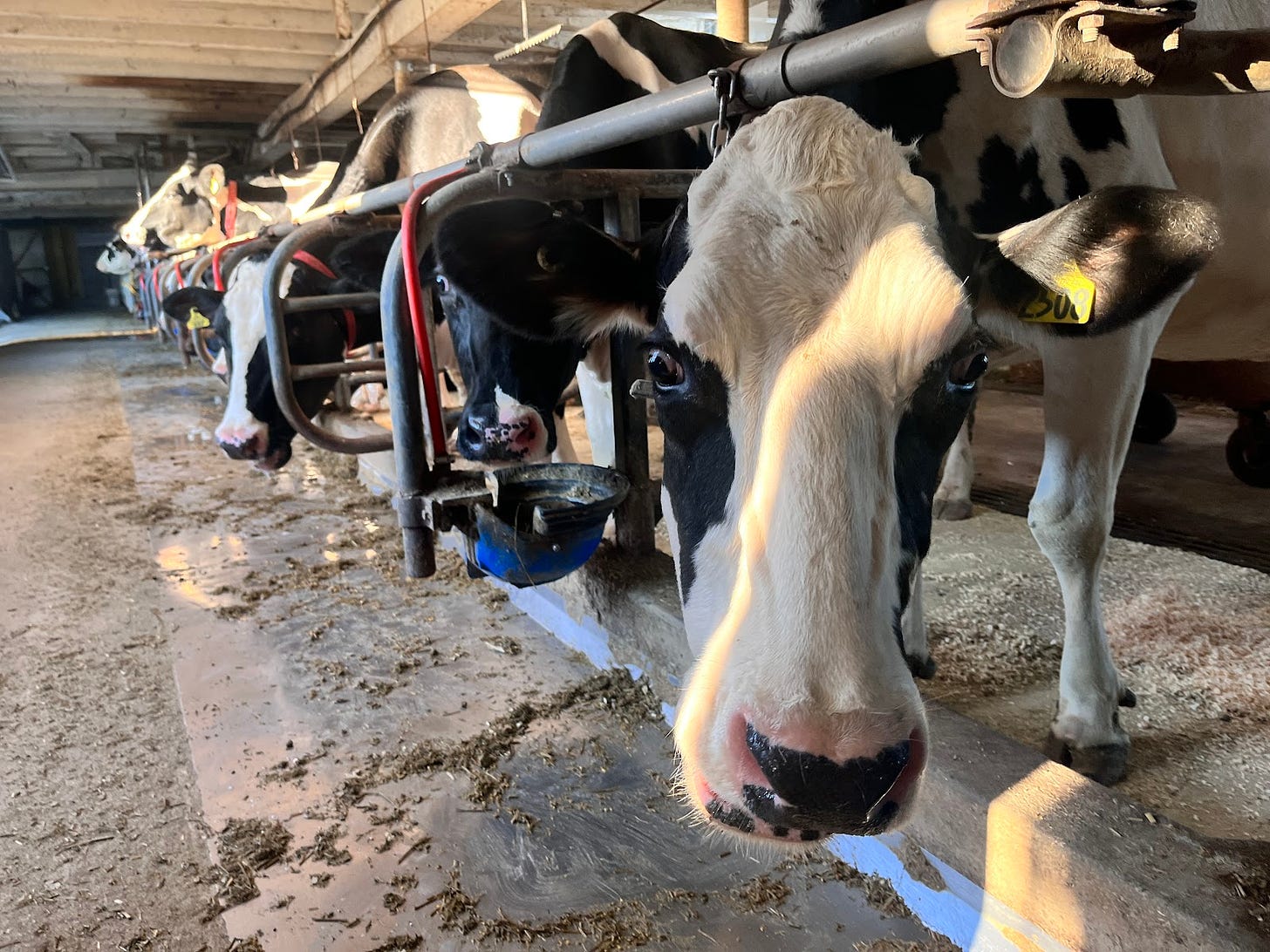

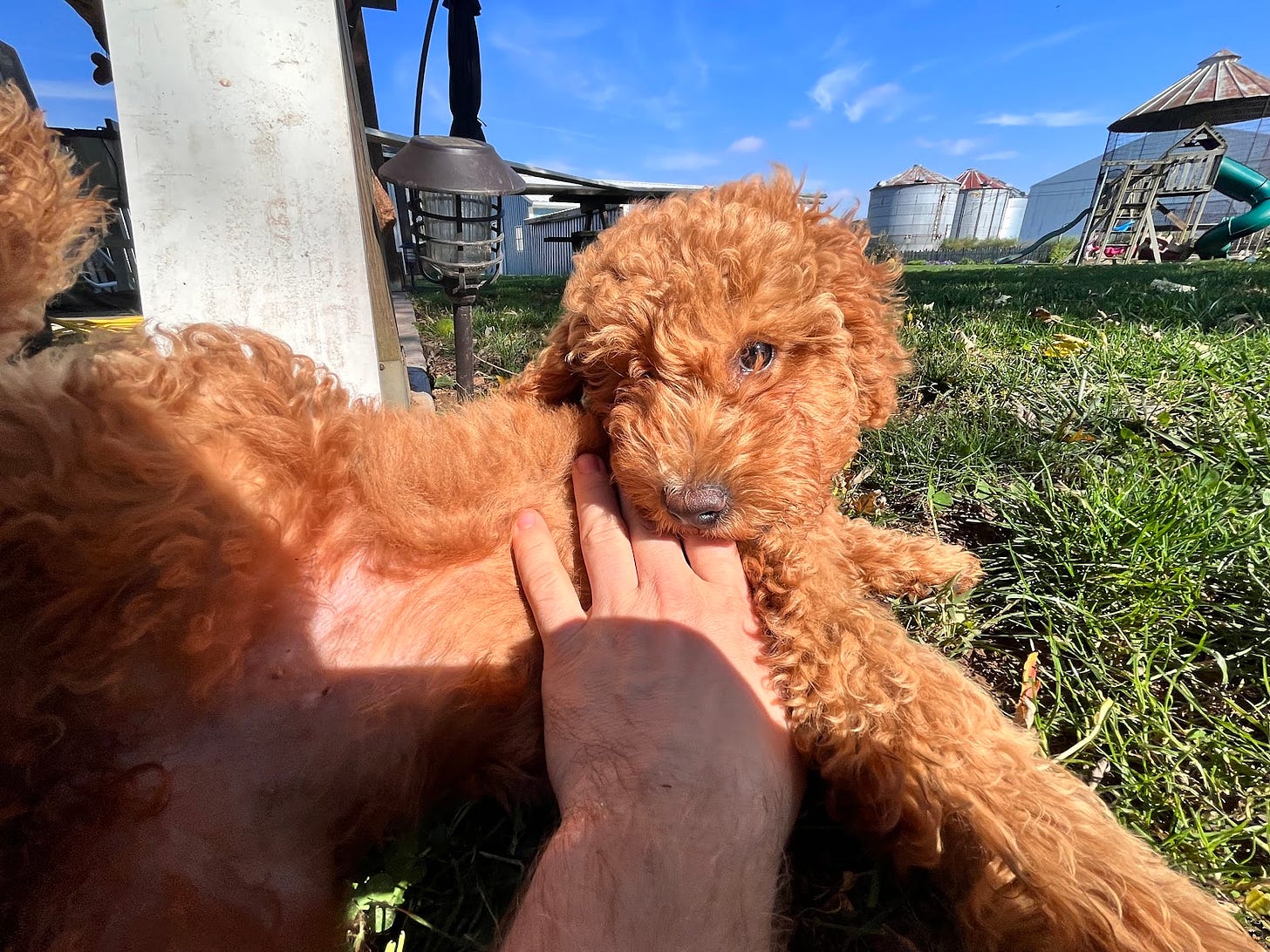
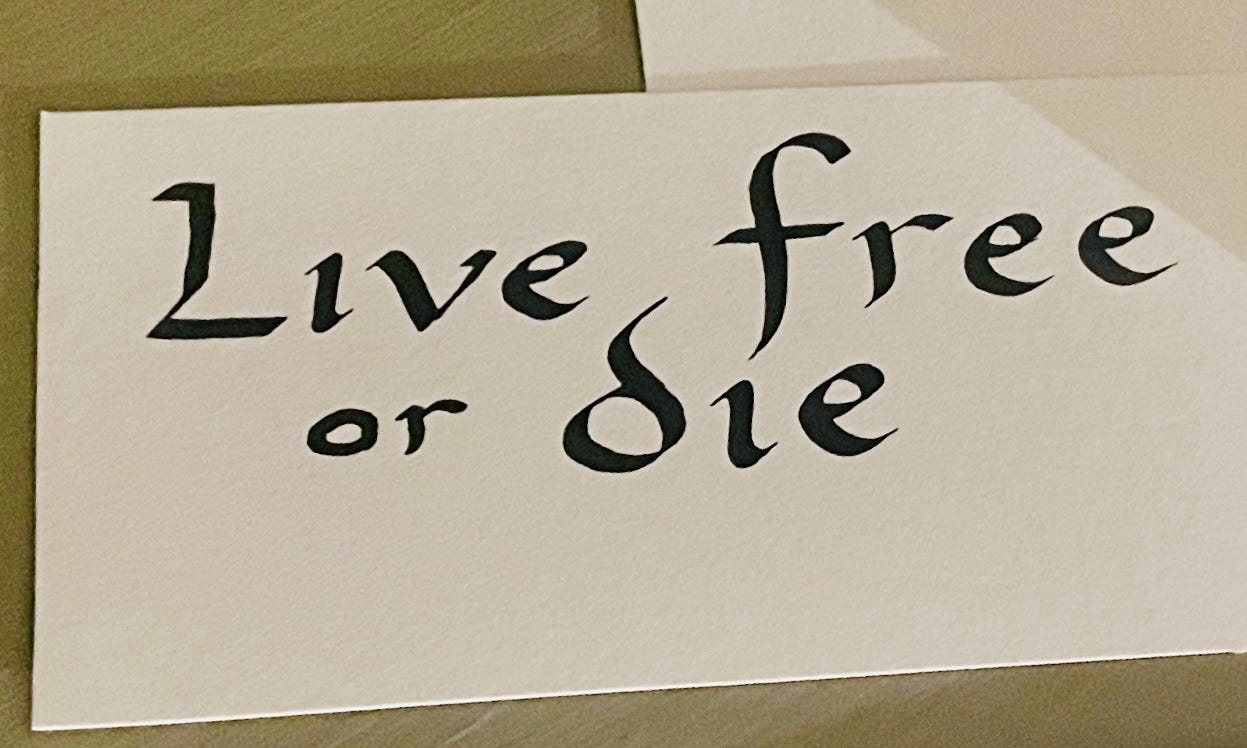
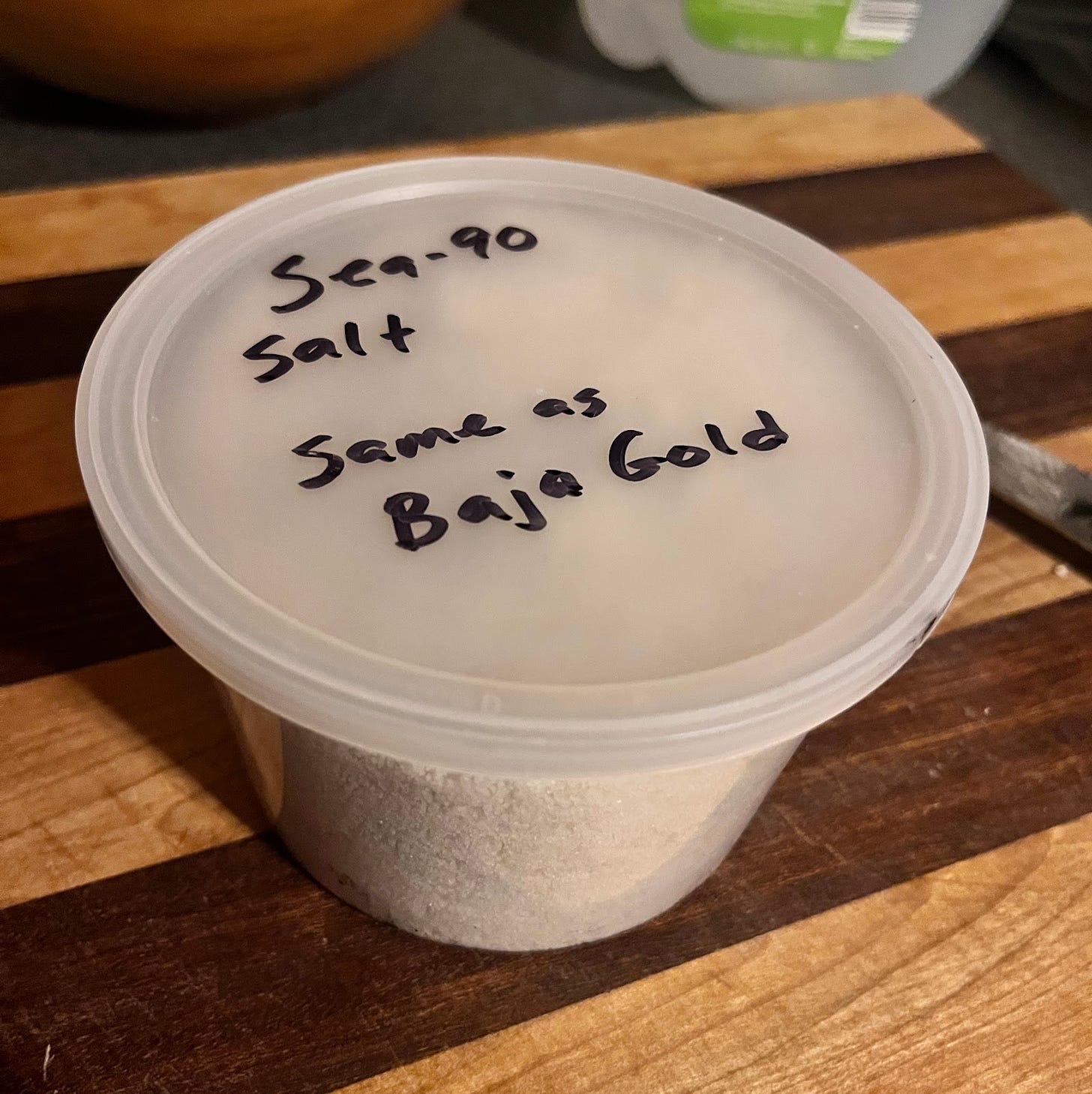


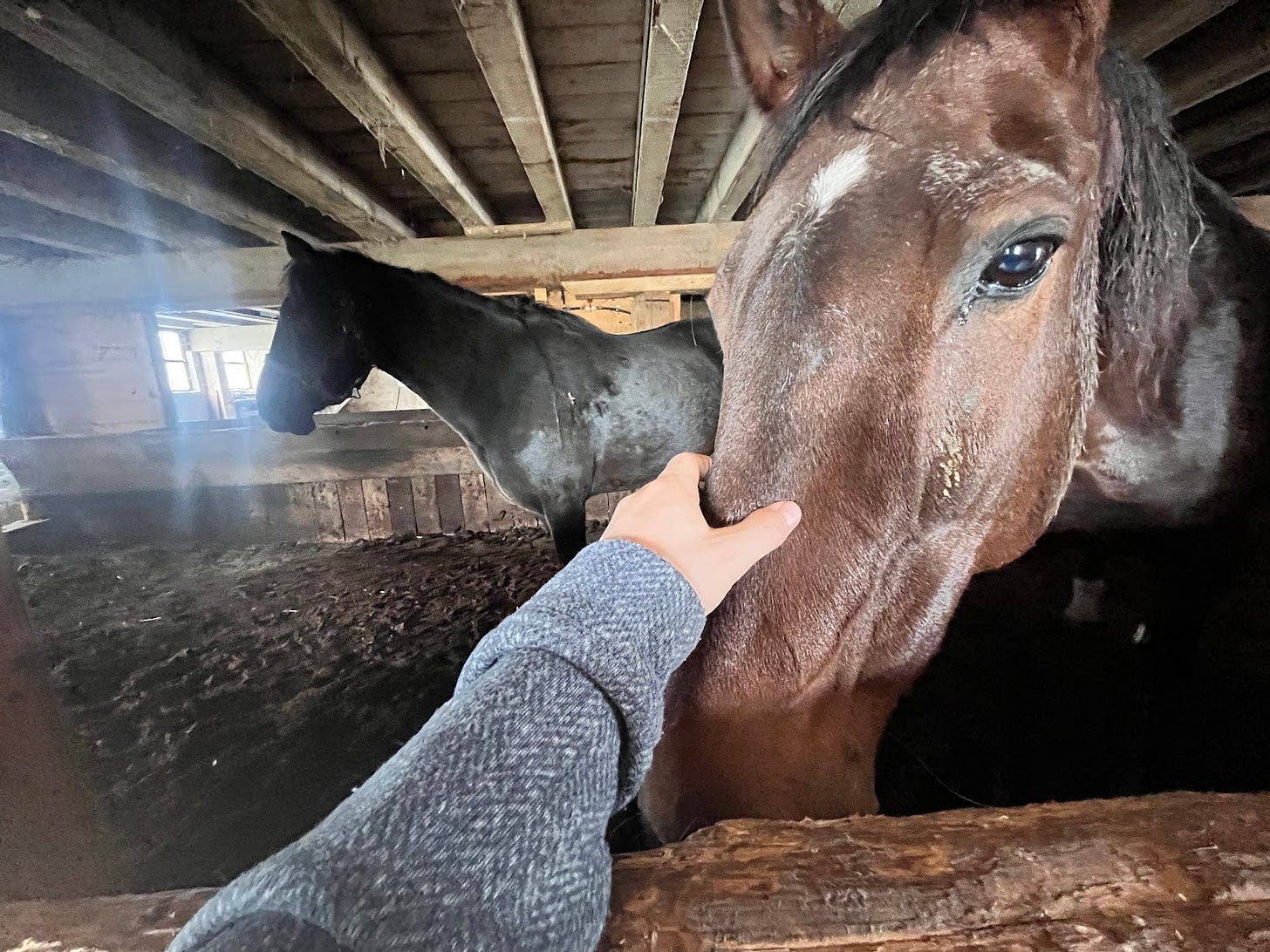
Love this man, sounds like an awesome experience!
Great read. Felt like I was there! Live simply and eat real food! It’s a great way of life... on or off the ‘net’:) I want a ride in your Tesla.